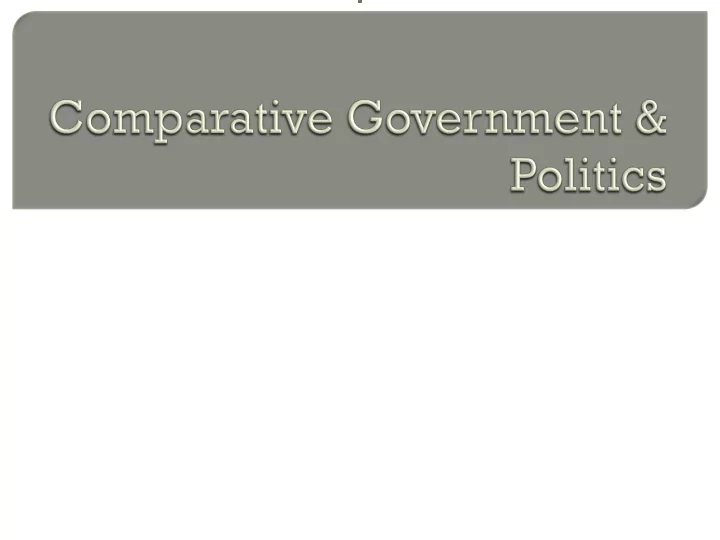

Fall 2013
GLS102 Comparative Government & Politics Fall 2013 2
Worldview; 19 th century; Production system: economic system = political Class struggle: bourgeoisie proletariat End of private property; Collectivity & equality: “fro rom ea each accord rding to his abilities es, to ea each accord rding to his need eeds .” Through synthesis revolution Terminology: communism, socialism, social democracy, capitalism, liberalism GLS102 Comparative Government & Politics Fall 2013 3
USSR (1917 - 1991): Lenin, Stalin, Khrushchev, Gorbatsjov Eastern European hemisphere (1989). China (1949) Mao, Deng Asian hemisphere (N. Korea, Laos, Vietnam). Cuba (1959). 1980s: 1/3 of the world population: Note: not in the most industrialized countries of the world. GLS102 Comparative Government & Politics Fall 2013 4
Political regime: • Dominated by the communist party; • System of co-optation and corporatism. Civil society è limited: • System seeks to downplay gender, religion, ethnicity. GLS102 Comparative Government & Politics Fall 2013 5
Political economy: • No private property; • Central planning instead of market mechanism; • Nationalization of means of production; • Full employment; • State provides extensive public goods… • Characteristics of capitalist system eliminated: Property rights Profit Unemployment competition GLS102 Comparative Government & Politics Fall 2013 6
Renewed ‘Cold War’ tension since 1980s Political & economic integration too complex. Reform in USSR (Glasnost & perestroika) to address economic stagnation leads to increasing opposition to the whole political regime; Eastern European ‘Satellite’ states experience smooth revolutions (1989). Germany reunites Fall of the Wall GLS102 Comparative Government & Politics Fall 2013 7
Cuba, North Korea, Vietnam persist; And of course China: only in name? Strong economic reforms, but oppression of freedom of speech. Tiananmen Square protest also in 1989 GLS102 Comparative Government & Politics Fall 2013 8
Level of modernization; • Economic development; • Level of education. Role of elites; International Relations; Culture; GLS102 Comparative Government & Politics Fall 2013 9
Political regime; Civil society; Economic system. GLS102 Comparative Government & Politics Fall 2013 10
Reform state autonomy & capacity: • From authoritarian regime to Democracy: Presidential system or parliamentary system; SMD, PR or mixed. Illiberal democracy; Authoritarian regime; And sometimes a later transition to democracy (McFaul) • (Re)forming institutions; • Establishing commonly felt RULE - OF - LAW . GLS102 Comparative Government & Politics Fall 2013 11
GLS102 Comparative Government & Politics Fall 2013 12
Reemergence of religion; National & ethnic identity; Freedom to associate; Freedom of speech; Political participation. GLS102 Comparative Government & Politics Fall 2013 13
Michael McFaul article ‘Transitions from Communism” GLS102 Comparative Government & Politics Fall 2013 14
Legacy of socialism and communism in contemporary society: • Why did communist regimes, in general, fail? McFaul’s 7 conditions applied to the world today EXAMPLES GLS102 Comparative Government & Politics Fall 2013 15
Trigger: Fraud – not crisis Semi autocratic regime Unpopular incumbent United opposition • Possibility to mobilize the ‘masses’ Independent electoral monitoring capabilities (NGOs) Some independent media Splits in elite & security forces GLS102 Comparative Government & Politics Fall 2013 16
Towards a capitalist system: • Privatization: (unknown process): How to hand over state assets to the public? • Marketization: Create a market based on demand & supply. Different models – live laboratory for economists. GLS102 Comparative Government & Politics Fall 2013 17
GLS102 Comparative Government & Politics Fall 2013 18
GLS102 Comparative Government & Politics Fall 2013 19
Recommend
More recommend